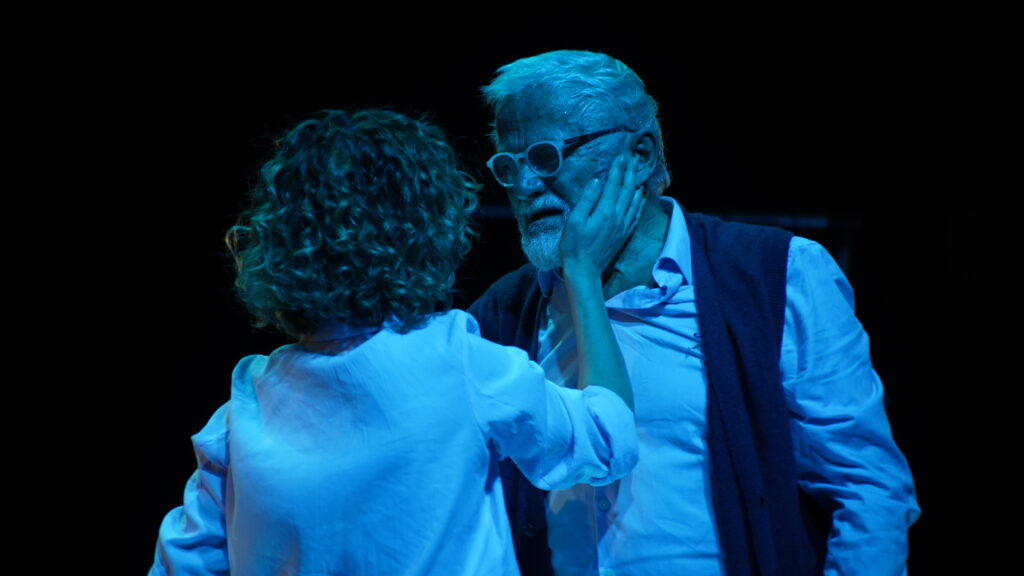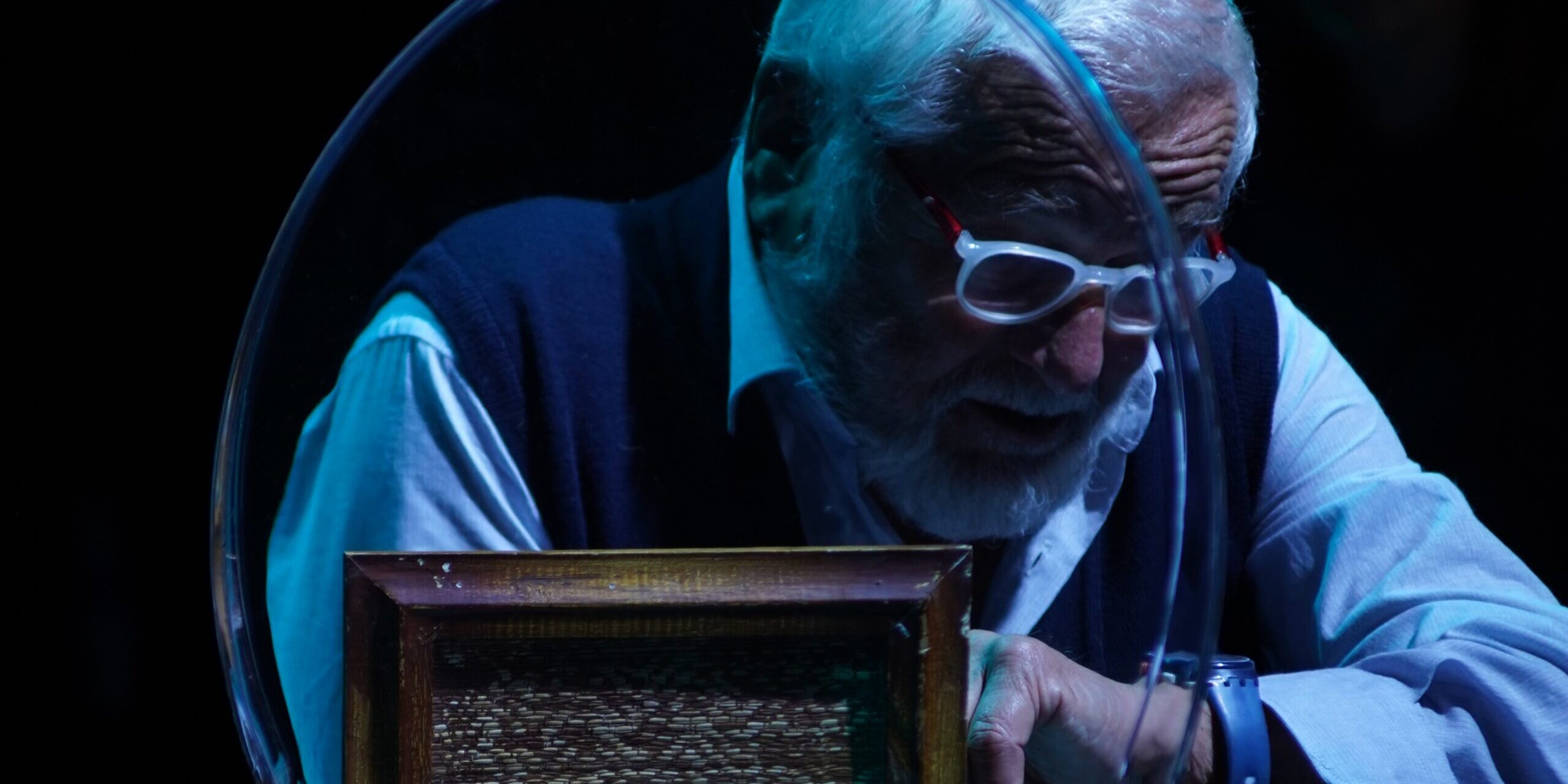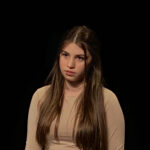National Experimental Theater “Kujtim Spahivogli”, Tirana
Dementia is, above all, a battle against time. For the person suffering with it, there is a desperate attempt to freeze the moments that will help them feel like themselves again. This is the lingering impression left by Florian Zeller’s 2012 play The Father. Zeller is one of the best known contemporary French playwrights. His work has been staged worldwide and The Father inspired an Oscar-winning film. In his production, director Erson Zymberi seeks to create a cold, distant atmosphere, with a melting ice cube placed at the centre of the stage – a powerful visual metaphor for the slow, inevitable passage of time. As the ice melts, it mirrors the fading clarity of the protagonist’s mind, creating a poetic reflection on memory, identity, and loss.
Viktor Zhusti’s performance in the role of André, the old man gradually losing his grip on reality, is truly haunting. He brings to life a version of the father who is both deeply affectionate and heartbreakingly lost. Zhusti manages to capture the tenderness of a loving, warm-hearted parent while simultaneously conveying the despair of a man slipping away from his own mind. His subtle gestures, sudden confusion, and moments of lucidity create a moving portrait of vulnerability, one that made the audience oscillate between empathy and sorrow throughout the play.
Egla Ceno, in the role of his daughter Anne, plays her character with a deliberate sense of coldness, both as a daughter and as a wife. Her calm restraint highlights the loneliness surrounding André, while also revealing her own quiet struggle as a woman torn between love, duty, and fatigue. The most powerful moment comes in Anne’s dream, where she imagines suffocating her father in his sleep. This scene brought new intensity to a character who had seemed distant until this moment, suggesting that Anne was slowly giving up on her relationships altogether. Alongside her, Pjerin Vlashi, as Pierre, Anne’s husband, gives a subtle and layered performance, portraying a man divided between frustration and pity, whose compassion carried an unsettling hint of superiority.
The other characters, embodying fragments of André’s mind, move around the stage like marionettes, controlled by a force that could no longer truly hold them. Linda Jarani (Laura) and Adriana Tolka (the alternate version of Anne) masterfully create this fragile, shifting energy, giving the play a deeper emotional and psychological layer. Through their nuanced performances, they conveyed both tenderness and detachment, making it clear that their connection to André existed only within the confines of his disoriented mind. The way they approached him generated a quiet discomfort, as if the audience could feel that these figures were nothing more than projections of his fading mind – his final attempts to grasp meaning and intimacy before everything dissolved.

The Father
The most distinctive element of Zymberi’s staging was the melting ice cube, inside which a wristwatch was placed – a striking and poetic metaphor for time slipping away. The concept was powerful and well thought out. Bekim Korça’s scenography was designed in a stylized, cold manner, using minimal and symbolic pieces of furniture that enhanced the sense of emptiness and emotional distance. As André’s mind deteriorated, these pieces subtly shifted in form and location, becoming increasingly unfamiliar to him – a visual reflection of his growing disorientation. The ice cube, which was placed at the front of the stage throughout the performance, slowly melted as the play unfolded. However, while the symbolism of the ice cube was compelling, its use felt too sporadic. As the central metaphor of the play, it could have been integrated more consistently and purposefully throughout the performance. Though visually evocative, the decision to only use it occasionally sacraficed some of its emotional weight and symbolic strength.
The central drama of the play – the father’s relationships with those around him – was conveyed clearly and with emotional precision. However, the production could have explored further the dimensions suggested by Zeller’s text. For example, André repeatedly compares Anne to his late wife, yet the play offers little insight into how his marriage influenced him or shaped his perceptions of his daughter. Additionally, the brief mention of the nursing home could have been developed to reflect more realistically the social and political context of such institutions, showing how they treat individuals facing cognitive decline.
Zymberi’s staging captured the characters’ inner drama in a dynamic manner. A striking example is the scene where all the characters engage in a frenzied dance under disco lights, with André leading them while wearing a motorcycle helmet. Mariel Brahimllari’s choreography turned the movements into fragmented, surreal gestures, reflecting the fractured reality of André’s mind. The lighting design amplified this effect, casting uneven, unpredictable patterns across the stage, dictating the rhythm and mood of each scene in a deliberately chaotic way.
The most moving moment of the play comes when André, an elderly man, dressed in diapers and playing with children’s toys, cries out his mother’s name. It is a heart-wrenching scene, charged with vulnerability and raw emotion, capturing the full weight of his disorientation and loss. In that instant, the audience feels the fragility of memory, the isolation of aging, and the desperate longing for comfort and connection. It is an unforgettable finale which lingers long after the curtain falls.
Credits:
Author: Florian Zeller//Director/: Erson Zymberi /Scenography: Bekim Korça//Choreography: Mariel Brahimllari
Cast: Viktor Zhusti, Egla Ceno, Pjerin Vlashi, Linda Jarani, Adriana Tolka
For tickets and further information








